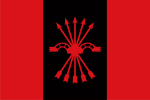Philippine Falange
In today's article, we will delve into the fascinating world of Philippine Falange, exploring its different facets and delving into its impact in different areas of life. From its origin to its evolution today, Philippine Falange has been the subject of interest and debate, sparking the curiosity of experts and fans alike. Along these lines, we will learn more about Philippine Falange and its relevance in society, as well as its influence on everyday aspects and on the development of various disciplines. Get ready to embark on an exciting journey through the history, current events and future of Philippine Falange.
Spanish National Assemblies Juntas Nacionales Españolas | |
|---|---|
 | |
| Leader | Andrés Soriano Enrique Zóbel de Ayala |
| Founded | 1936 |
| Dissolved | 1945 |
| Ideology | Falangism |
| Political position | Far-right |
| Party flag | |
 | |
The Philippine Falange, the informal name for the Spanish National Assemblies of the Philippines (Juntas Nacionales Españolas), was a Philippine falangist political party that was a branch of the Spanish Falange. It was founded in 1936. The party was initially led from the late 1930s by Spanish citizen and businessman Andrés Soriano. A leadership struggle occurred between Martín Pou and Enrique Zóbel de Ayala.
The party was effectively dissolved when Soriano was quietly granted by the government Filipino citizenship. It was done to avoid a major political formation within the Philippines which was at least tacitly supportive of the Axis Powers, as Franco's Falange and subsequent Spanish Government was. Others followed suit, preventing the threat of their properties being seized by the Allied powers. Other members collaborated with the Japanese during the occupation, excluding Soriano who joined with Manuel Quezon and the government of the Philippine Commonwealth in exile, in the United States, as well as the Spanish Filipinos who formed Commonwealth military and guerrilla forces in Negros in the Philippines.
See also
References
- ^ a b c Hermógenes E. Bacareza: A history of Philippine-German relations. National Economic and Development Authority (NEDA) – APO Production Unit EDSA, 1980. P. 127.
- ^ Stanley Payne. Fascism in Spain, 1923–1977. Madison, Wisconsin, USA: Wisconsin University Press, 1999. P. 538.
- ^ Philippine studies, Volume 43. Ateneo de Manila University Press, 1995. P. 6.
This article about a Philippine political party is a stub. You can help Wikipedia by expanding it. |